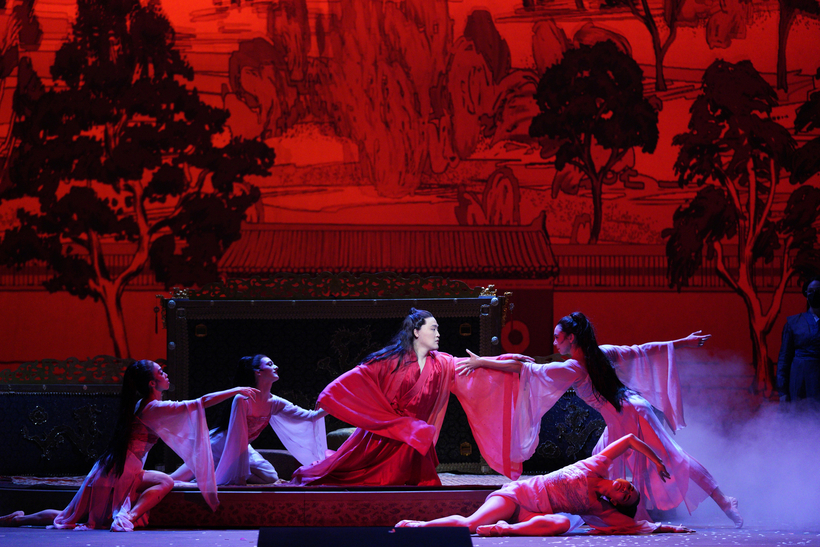To adapt a doorstop novel for the lyric stage, you need a big blue pencil. Tolstoy peoples the pages of War and Peace with a cast of more than 500. Prokofiev’s operatic epic retains an unheard-of 70 named parts. Bright Sheng’s Dream of the Red Chamber, drawn from a Chinese classic double the length of the Tolstoy, slashes Cao Xueqin’s slate of 400-plus characters to eight. The San Francisco premiere in 2016 took audiences by storm. Already it’s back, and this time viewers at home can catch it, too.
“If you ask 10 different Redologists what the novel is about, they would give you 10 different answers,” Sheng told The New York Times in 2016 (yes, “Redology” is a thing). “And if anyone asks me what this opera is about, I’ll say it’s a story of a love triangle. That’s it.”
A love triangle, we are told, that tears a dynasty apart—but that may be the least of it. As disclosed in the prologue, the nobleman Bao Yu is the avatar of Stone, a monumental block left over from the construction of heaven. In that other dimension, his sickly cousin Dai Yu was Flower, a crimson bloom Stone sustained with dew for more than 3,000 years. Sensibly enough, Sheng prioritizes their earthly tragedy.

Artfully assembled for the Golden Gate demographic, Dream of the Red Chamber highlights cultural differences even as it transcends them. On the one hand, the theme, and the high-profile creatives are all Asian, from the English-language librettist David Henry Hwang to the Oscar-winning designer Tim (Crouching Tiger, Hidden Dragon) Yip. Yet the medium is Western both in form and in its expressive techniques. Call it “fusion” if you will, but isn’t this beyond? Picture, for purposes of comparison, a Moby-Dick in Kyoto, enacted in fluent Japanese by Americans trained for lives onstage at the Noh.
Critics in 2016 were more receptive to Sheng’s distinctive instrumental invention than to his singer-friendly, school-of-Puccini vocal writing, which paying customers liked just fine. So, presumably, do singers. This time around, the personable South Korean tenor Konu Kim, winner of both the First Prize and the Audience Prize at the Operalia competition in 2016, heads the cast as Bao Yu (Stone), opposite the soprano Meigui Zhang as the sickly Dai Yu (Flower) and Hongni Wu as Bao Chai, the less-tender petal Bao Yu is tricked into marrying. It bears stressing that their bread and butter, for which they were trained, lies with the likes of Mozart, Rossini, Verdi—not with traditional Chinese forms of music theater, a horse of a different color entirely.
The man on the podium bears watching, too. A Yale-educated Singapore native, the charismatic Darrell Ang first encountered classical music in the Western tradition watching Looney Tunes on TV. The thought of music as a profession never crossed his mind until the night of his 14th birthday, when a voice in his dreams decreed that he must become a conductor. Ah, destiny!
Dream of the Red Chamber streams live on June 19 at two P.M. Pacific Time, and will be available on demand for 48 hours beginning June 20 at ten A.M. Pacific. Live performances continue through July 3
Matthew Gurewitsch writes about opera and classical music for AIR MAIL. He lives in Hawaii

